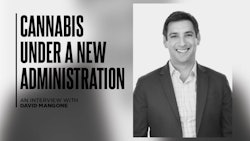
Cannabis prohibitionist group Smart Approaches to Marijuana (SAM) responded to claims on Nov. 25 that it improperly communicated with the Drug Enforcement Administration (DEA) leading up to next week’s cannabis rescheduling hearing.
The hearing, to determine the proper schedule for cannabis under the Controlled Substances Act (CSA), will commence with preliminary proceedings on Dec. 2 and resume with witness testimonies tentatively scheduled for January or February.
DEA Administrative Law Judge (ALJ) John J. Mulrooney—whom DEA Administrator Anne Milgram authorized to conduct a fair and transparent hearing process—issued a pair of orders last week to allow the DEA and SAM to reply to a legal motion claiming the two conspired.
The DEA had already taken the opportunity to respond earlier in the day on Monday.
SAM is one of 25 participants the DEA designated for inclusion in the hearings.
Specifically, in a joint motion filed on Nov. 18, two other designated participants advocating in favor of cannabis rescheduling (the “movants”) asked Mulrooney to disqualify and remove the DEA and SAM from the hearing process.
RELATED: Cannabis Rescheduling Advocates Say DEA Stacked Deck, Colluded With Prohibitionists
In SAM’s legal response issued Monday, the organization asked Mulrooney to deny the removal requests made by the movants: cannabis company Village Farms International and veterans group Hemp for Victory.
“In short, the motion is a transparent effort to smear both SAM and the DEA in an attempt to eliminate from this proceeding one of the strongest voices opposing rescheduling of marijuana,” SAM’s legal team wrote in the response. “The tribunal should deny movants’ invitation to create a sideshow requiring SAM and its counsel to expend more time and funds defending against unfounded attacks and instead should permit SAM to focus on the merits of these proceedings.”
Patrick F. Philbin and Chase Harrington, of Torridon Law PLLC, authored the response on SAM's behalf.
However, SAM did not deny having communications with the DEA. Instead, the group’s lawyers argued that no ex parte communications between SAM President/CEO Kevin Sabet and DEA officials took place after the notice of proposed rulemaking (NPRM) to reschedule cannabis appearing in the Federal Register.
Specifically, Attorney General Merrick Garland signed the NPRM on May 16 to reclassify cannabis from a Schedule I to Schedule III drug under the CSA, following the recommendation made by the U.S. Health and Human Services Department and the Food and Drug Administration. The NPRM was published in the Federal Register on May 21.
The proposed rule’s publication came after Sabet posted a series of comments and replies on social media from May 6 to May 20 related to the NPRM. Specifically, SAM’s legal team points out that only a May 6 post mentions the receipt of any information from the DEA:
“BIG: I can now say with full confidence that the Administrator of the DEA, Anne Milgram, did NOT sign the rescheduling order, breaking with five decades of precedent and established law and regulations (two confidential sources inside DEA and another outside DEA with intimate knowledge tell me),” Sabet wrote on X.
“That post was issued 10 days before DOJ publicly released the NPRM on May 16, and 15 days before the NPRM was published,” SAM’s legal counsel wrote in Monday’s response. “Sabet was hardly the only advocate in this space posting online about agency activity prior to the NPRM’s issuance.”
Although the NPRM is historically signed by the DEA administrator—not the attorney general—and although Sabet called it “BIG” news at the time, SAM’s legal team downplayed the significance in Monday’s response, saying that Sabet’s posts were not unique.
Specifically, SAM’s lawyers pointed to a Wall Street Journal article from March 9 that indicated DEA officials were at odds with President Joe Biden’s administration’s push to loosen federal restrictions on cannabis following a scientific review that determined the plant has currently accepted medical use in the U.S.
However, Sabet’s prediction that Garland would sign the NPRM, and not Milgram, wasn’t reported as public knowledge until The Associated Press broke the news on May 20.
SAM’s legal counsel also pointed to rescheduling proponent Anthony Varrell’s May 16 social post that “accurately predicted” the NPRM would be released that day: “I have heard through the grapevine that the register might ring today.”
The lawyers also claimed that Varrell “appears to be an associate” of Village Farms because he helped the cannabis company produce a YouTube video featuring its 2.2-million-square-foot cultivation facility in Canada. The video was produced by The Dales Report, an industry media group, of which Varrell is a host.
However, Varrell did not claim to have connections at the DEA nor is he one of the agency’s 25 designated participants for the upcoming cannabis rescheduling hearing.
Still, SAM’s lawyers wrote, “If every tweet claiming insider knowledge of the events leading up to the formal publication of the NPRM were a basis for inquiry by this court, that unnecessary sideshow would quickly overtake the merits, both here and in every similar proceeding.”
The movants offered no evidence that Sabet, a former three-time White House Office of National Drug Control Policy adviser, had improper communications with the DEA after May 21, according to the response.



























